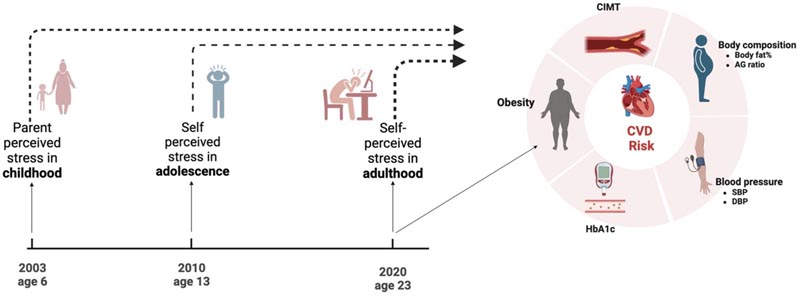Young adults who reported greater stress as adolescents were more likely to have high blood pressure, obesity and other cardiometabolic risk factors as adults, a new study published in the Journal of the American Heart Association finds .
Research Highlights:
|

Young adults who reported more stress during their adolescence through adulthood were more likely to have high blood pressure, obesity and other cardiometabolic risk factors than their peers who reported less stress, according to new research published in the Journal of the American Heart Association , an open access journal of the American Heart Association.
Cardiometabolic risk factors often occur together and are a significant cause of cardiovascular disease. These include obesity, type 2 diabetes or prediabetes, high cholesterol and high blood pressure , the researchers noted.
Understanding the effects of perceived stress that begins in childhood is important for preventing, decreasing or managing higher cardiometabolic risk factors in young adults, said study author Fangqi Guo, Ph.D., a postdoctoral researcher at the Keck School of Medicine. , University of Southern California, Los Angeles.
"Our findings suggest that patterns of perceived stress over time have a far-reaching effect on several cardiometabolic measures, including fat distribution, vascular health and obesity ," Guo said. This could highlight the importance of stress management as early as adolescence as a health-protective behavior.
In 2020, cardiometabolic diseases, including cardiovascular disease and type 2 diabetes, were the most prevalent chronic health conditions, together accounting for nearly a quarter of all deaths in the United States, according to statistics from the American Heart Association. In 2023, the American Heart Association noted the strong connections between cardiovascular disease, kidney disease, type 2 diabetes, and obesity , and suggested redefining cardiovascular risk, prevention, and management.
Childhood adversities affect cardiometabolic health across the lifespan, and interventions that improve early exposures may be more appropriate than interventions for the effects of cardiovascular disease risk later in life, according to a Scientific Statement from the American Heart Association 2017: Childhood and Adolescent Adversity and Cardiometabolic Outcomes . In recent decades, researchers have found that perceived stress is a risk factor for cardiometabolic health conditions.
For this study, researchers analyzed health data from the Southern California Children’s Health Study. Participants had enrolled in the study as children along with their parents, and then participated in follow-up assessments as adolescents, mean age 13, and young adults, mean age 24.
At each stage, stress was measured with a 4-item Perceived Stress Scale, a questionnaire about feelings and thoughts during the past month. Study participants were classified into four groups based on risk: consistently high stress over time, decreasing stress over time, increasing stress over time, and consistently low stress over time.
To assess cardiometabolic risk in young adulthood, Guo and colleagues used measures of carotid artery intima-media thickness; systolic and diastolic blood pressure; weight, percentage of body fat and fat distribution; and hemoglobin A1c.
The analysis found:
- Consistently highly perceived stress from adolescence to adulthood was associated with increased risk of cardiometabolic diseases in young adulthood. If individuals experienced higher levels of stress from their adolescence to adulthood, they were more likely to have poorer vascular health, higher total body fat, more fat around the belly, and higher risk of obesity compared to those who felt less stressed with time.
- Overall, higher levels of perceived stress were also associated with increased risk of cardiometabolic health conditions. For example, adults who experience higher levels of stress tended to have poorer vascular health and higher systolic and diastolic blood pressure.
Although we assumed that patterns of perceived stress should have some association with cardiometabolic measures, we did not expect such consistent patterns across various risk factors, Guo said.
Healthcare professionals should consider using the Perceived Stress Scale to assess individuals’ stress levels during clinic visits. This way, those with higher stress levels can be identified and treated sooner.
Study details, background or design:
- Researchers reviewed data from 276 people from Southern California communities participating in the Southern California Children’s Health Study. Participants were enrolled as a child from 2003 to 2014 and participated in follow-up health assessments as adults from 2018 to 2021.
- About 56% of the participants were girls/women; 62% identified as white; 5% as Asian; 1% as black or Native American; and 13% were classified as other. About 47% identified as Hispanic.
- The researchers investigated perceived stress reported by participating parents during childhood (mean age about 6 years); then by the participants, in adolescence (average age of about 13 years); and then again in young adulthood (mean age almost 24 years).
One limitation was the relatively small size of the study. Studies with more participants would help clarify the results.
Conclusions We observed that adults with high perceived stress, especially those with consistently high perceived stress from adolescence to adulthood, may be more likely to develop cardiometabolic risk factors in young adulthood. Our findings suggest that promoting healthy coping strategies for stress management early in life (e.g., adolescence) may facilitate the prevention of cardiometabolic diseases. Future work should investigate the impacts of initiating stress management interventions earlier in life (e.g., adolescence) on stress patterns over time and implications for cardiometabolic health. Repeated measures of perceived stress over time may aid early identification of higher-risk individuals and opportunities to intervene to improve cardiometabolic health in the future. |
Clinical perspective
What’s new?
- This prospective study evaluated the influence of perceived stress over time on cardiovascular health in adulthood.
- Parental stress in early childhood and participants’ perceived stress in both adolescence and adulthood were examined in relation to cardiometabolic risk in adulthood.
- Cardiometabolic risk was comprehensively assessed using 8 objective measures, namely, carotid intima media thickness, systolic and diastolic blood pressure, body mass index, body fat percentage, android/gynoid ratio, and glycated hemoglobin.
- Our findings suggested that individuals with consistently higher levels of perceived stress from adolescence to adulthood had greater cardiometabolic risk than individuals with other stress patterns.
What are the clinical implications?
- Increased stress in adolescence and patterns of elevated stress over time may be important contributors to cardiometabolic health in young adults.
- Studies are needed to determine whether stress management in adolescence can be an effective approach to reducing cardiometabolic risk in adulthood.
















